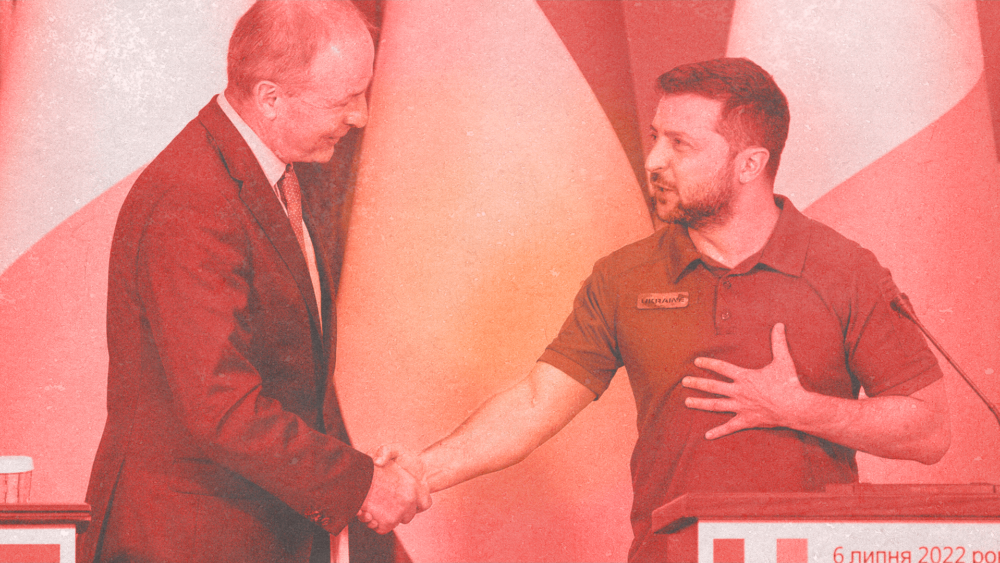The war in Ukraine continues to scrutinise countries’ neutrality ahead of this year’s ‘Davos of Defence’. Hannah Lang takes a close look at Ireland’s unstable stance.
A few weeks ago, the German public saw its foreign minister, the Greens’ Annalena Baerbock, openly state that “we are fighting a war against Russia”. Regardless of her ministry’s subsequent efforts to blame infelicitous wording, the German chancellor Olaf Scholz’s decision to approve the delivery of Leopard 2 tanks to Ukraine the following day managed to settle any remaining doubts. There is neither political nor military neutrality to be found in most European countries’ current actions, despite the dire need for peace talks.
The further escalation of the war in Ukraine presents itself in a different light when observed from a European country which is struggling to hold on to its self-proclaimed neutrality. In the Republic of Ireland, Russia’s invasion of Ukraine and the ensuing proxy war on European soil has sparked fresh debates on the country’s foreign policy. While the tradition of Irish neutrality is noteworthy, the country has never been part of the Non-Aligned Movement. Still, since the 1960s, there has been a legal triple lock in place preventing any Irish military deployment overseas without the explicit approval of the Irish government, parliament, and the United Nations Security Council. In the same spirit, Ireland has so far rejected its EU partners’ advances to establish joint defence arrangements.
However, although the Irish constitution “affirms its adherence to the principle of the pacific settlement of international disputes”, its foreign policy seems to have come to an unprecedented crossroads. Former Taoiseach Micheál Martin stated last year that Irish neutrality needs to “evolve” given that “the world has changed”, words which have not been chosen in light of any other past conflict. This comes at a time when workers, students and families shoulder the burden of the aggravating housing and cost of living crises in Ireland as in most parts of Europe. While people take to the streets to protest these precarious conditions – significantly exacerbated by geopolitical tensions – the Irish Department of Defence welcomed a historically high level of capital funding in 2022.
Wanton neutrality?
If the abandonment of neutrality is about taking a clear position against imperial bullies and the military invasion and oppression of people, why has it not been called into question before? In a capitalist state, such as Ireland, political neutrality can arguably only go so far. To elites around the world profiting off neoliberal policies, a radical anti-colonial and anti-imperial stance has never been an appealing concept. So what exactly is neutrality worth under capitalism? Evidently, it keeps producing ambiguous scenarios such as the one we are currently experiencing: An unspoken rule for solidarity with Ukraine after decades of deafening silence over US troops and the CIA using Irish airports to further their wars in Afghanistan and Iraq. Genuine neutrality should not differentiate between those affected by power politics.
It seems as if what most Irish politicians want to imply by saying Irish neutrality has to “evolve” is a shift towards “expedient neutrality” – as we will witness in the upcoming Munich Security Conference (MSC). The MSC, also known as the ‘Davos of Defence’, is where US vice president Kamala Harris is expected to map out the next steps of the war in Ukraine. We are thus set to bear witness to more praise of rearmament in the name of peace and justice – feeding the military industrial complex instead of families and putting the protection of imperial and corporate interests over the protection of war-torn populations.
Neutrality proves its backbone – or the lack thereof – when put under pressure. Ireland – especially with regard to its own history of anti-colonial struggle and internationalist solidarity – could also ‘evolve’ into that direction by growing a more robust spine and supporting the creation of a New Non-Aligned Movement as called for by DiEM25.
How to resist playing ball
Meanwhile, the MSC’s yearly report speaks volumes about the security narrative Western countries are aiming to create. Indeed, this exclusive event might be the arena par excellence to foster the illusion that a new Cold War might be the solution to geopolitical turmoil. Yet, the report’s wording is quite revealing of the obsession with the defence of “liberal democracies” which, in fact, have become the masters of economic warfare.
Ireland, by itself – both within the European Union as well as internationally – might not have a decisive influence on external meddling with regard to Ukraine. Yet stance matters, both politically and militarily. A strong alliance of non-aligned countries calling out the flawed definition of security propagated by the MSC and its hosts must debunk all forms of warmongering. Otherwise this new ‘Re:vision’ will continue to serve the global oligarchy for the opportunistic endeavour it is – be it under the liberal guise of human rights or in the form of military aggression which aims to “put others in their place”. It is crucial to resist the illusion of a dichotomous clash which relegates those bearing the brunt of all conflicts – both people and planet – to mere pieces on a board.
The US magazine Foreign Policy wrote in April 2022 that “a key pillar of Dublin’s foreign policy may be another casualty of the conflict”. But instead of wavering, Ireland has the chance of embracing a position it has historically stood for and which is appreciated by its citizens with a new sense of urgency. Consistent neutrality will require more than words, but structural change. It has nothing to do with absolving attacks on any state’s integrity, including Russia’s attack on Ukraine – it is about seeing the bigger picture and joining forces to fight not each other, but the suffering of the 99 percent around the world.
Do you want to be informed of DiEM25's actions? Sign up here















